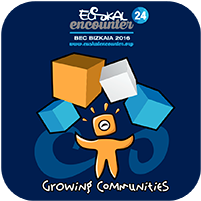For many years several participants of the Euskal belong to university debating clubs… We're old now so now we are judges or teachers… Yes, like those clubs in North American television series where two teams debate for and against a topic. And at last we have done it! The 2nd Euskal Encounter debating League will take place on Sunday at 20:00 in the Conference area! The debates can last from 10 minutes to half an hour, and participation is by randomly chosen pairs.
TOPICS OF DEBATE
The topics of debate will always be silly and absurd. There will be a list that you can consult on the Intranet and on the Forum. The topic will be one of three chosen by a draw, where one of the two that are rejected will be the topic for the final. It will consist of a question or statement that leads to two opposing positions; both teams will have 10 minutes to prepare their positions, which will also be established by a draw one minute before the debate (that is, you have to prepare for and against).
PROCEDURE OF THE COMPETITION
The competition consists of a Preliminary Phase and a Final Phase: 4 pairs will take part.
Preliminary Phase: 4 pairs, one against the other, paired 1 vs 1.
The final phase will be the match between the winning pairs of the matches from the previous phase.
Qualification criteria:
After the debate and some discussion time, the judges must name a winning team, with the judge adding to the minutes a score of 0 to 10 to assess the debate, not each team.
1.‐ Argumentation: preparation, structure of arguments, clear, coherent and sustained line of argument during the debate, defence of one's own line of argument, rejection and counterarguments for the arguments of the opponent.
2.‐ Oratory: structure of the discourse, clarity, richness of the language used, the use of silences, rhythms and tones, vocalisation.
3.‐ Non-verbal language: dominion of the space, use of hands, facial expressiveness, certain visual contact with the public/judges, staging.
4.‐ Minimum and added requirements: respect, punctuality, order, the use of (non-living) external elements,…–, image of teamwork.
5.- Tone: The composure and temperance of the members at the end of the debate is fundamental for a wise and fair decision.
The decisions and results of each judge can be appealed before the Competition Committee with backing arguments. The committee undertakes to likewise provide a grounded and inebriated response.
Procedure of the debate:
The in favour position will be that which starts the debate, the turns of which will take place as follows:
∙ In favour. Intervention: 3 minutes.
∙ Against. Intervention: 3 minutes.
∙ In favour. Refutation: 2 minutes.
∙ Against. Refutation: 2 minutes.
∙ In favour. Refutation: 2 minutes.
∙ Against. Refutation: 2 minutes.
∙ Against. Conclusions: 2 minutes.
∙ In favour. Conclusions: 2 minutes.
Interjections: During the interventions, any member of the team that is not speaking has the possibility of raising their hand to appeal to an orator of the opposing team during their speech, with the aim of making observations, questions or comments. These interjections may not be carried out during the conclusions. The orator will have the freedom to give them the word, and also to answer or not.
Original idea by Miren García


